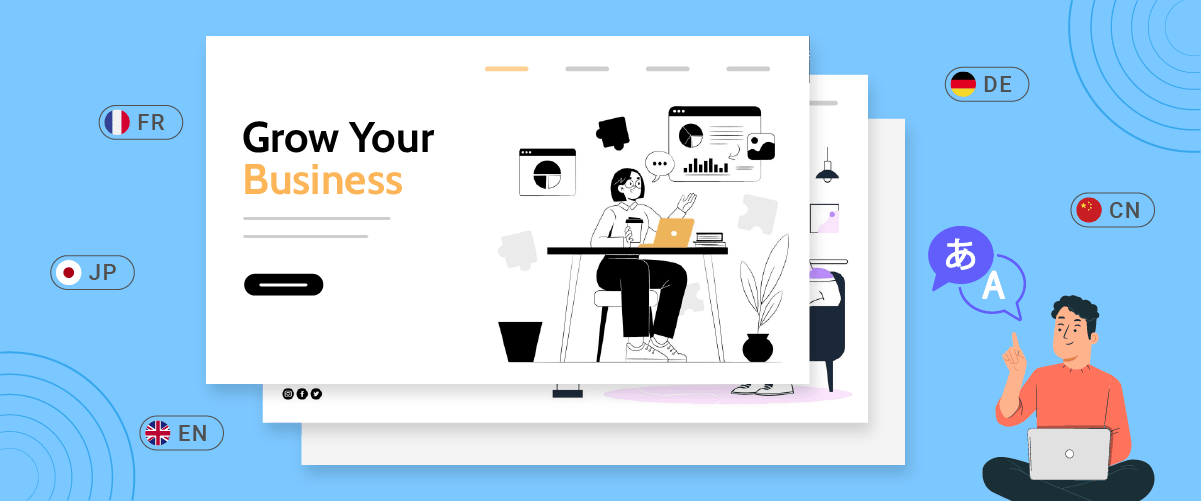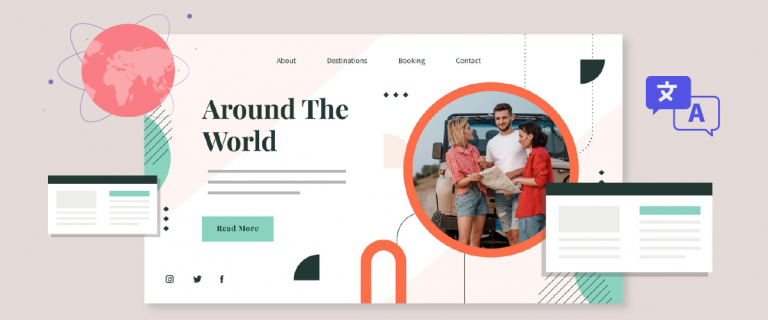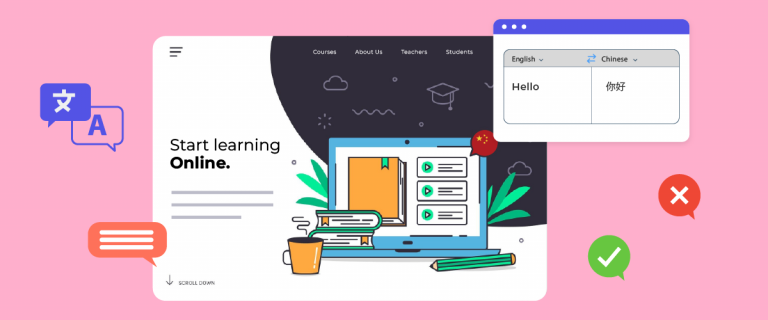As a business owner, you might have wondered whether you should translate website into various languages. Is it the right move? This is a common question, especially as the business industry becomes increasingly competitive and the internet connects us to greater opportunities.
English indeed dominates the internet realm. According to Poe Editor, around 26% of internet users understand English, meaning there are over 50% who do not comprehend the language. Further data shows that 74% of other internet users utilize languages other than English.
You could lose millions of potential customers if your website only provides English. Therefore, it’s crucial to translate your business website into various languages. But what types of businesses should be translated?
This article will discuss the types of businesses that should be translated into various languages. Let’s check if your business falls into this category. Let’s find out together!
7 types of businesses that should translate their website, and why!
So, here are several types of business that should be translated into several languages , complete with logic.
Businesses with international customers
Translating content into local languages expands the customer reach of eCommerce businesses and builds trust by communicating in a language that customers understand best. By translating product checkout, information, descriptions, and specifications into the native language, products become much clearer and easier to understand for international buyers.
This ensures that the transaction and checkout process runs smoothly without language barriers. This significantly enhances customer satisfaction and sales conversion rates.
Imagine an international customer visiting a product page on an e-commerce site. The product description and specifications are available in their native language, so they fully understand the product. This builds trust and confidence in the brand.
When the checkout process and payment page are also in their language, there are no confusing translations or instructions that could cause doubt or cancel the purchase. Customers can smoothly and comfortably complete transactions without language barriers or confusion.
The easier it is for users to make transactions, the higher the conversion value your business can achieve.
For example, international eCommerce IKEA which has several branches abroad such as Indonesia, Thailand, Singapore, Malaysia, etc.
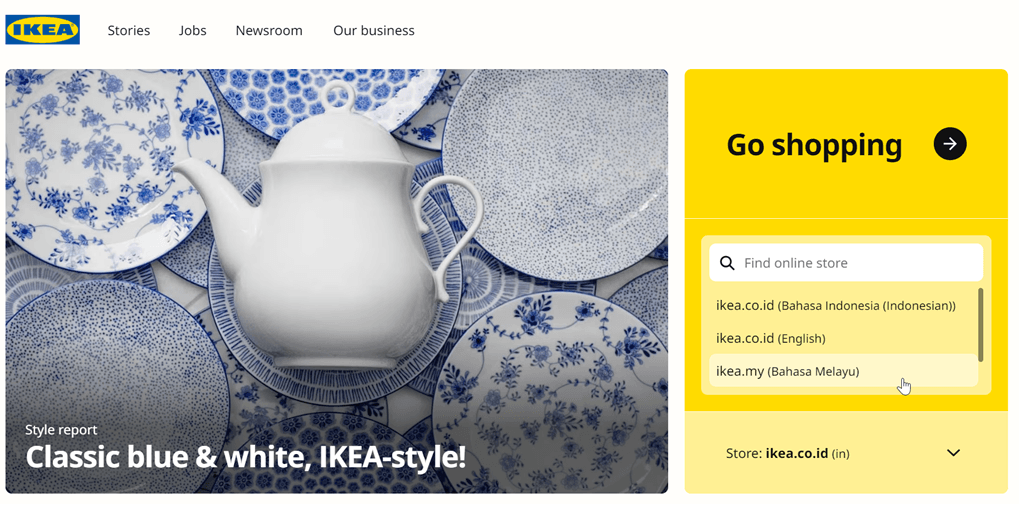
Businesses operating in countries with more than 1 national language
The second type of business is businesses located in countries that have more than one official language. Some countries with multiple official languages include Bolivia, South Africa, Singapore, Switzerland, etc.
If your business is located in these countries, it is important to translate into various languages, especially the official languages recognized in the country.
For example, a business in Montreal, Canada. Montreal is a city in Canada with two official languages, namely English and French. A business in Montreal must offer a website in both languages to serve all customers and comply with regulations.
By providing a website in the official languages understood by the majority of the population, businesses can reach a wider customer base and increase their market share. This is important for increasing sales and profits because customers will be happier and more satisfied shopping on a website that uses their language.
Furthermore, some countries also enforce rules requiring businesses to provide websites in the official languages of the country.
Businesses operating in the tourism or travel industry
The next business that needs a multilingual website is in the tourism sector because it is experiencing rapid growth. Travelers from various countries can easily explore the world and seek new and exciting experiences in other countries.
Therefore, for tourism and travel businesses, such as tour operators, hotels, airlines, and travel agents, translating the website is key to attracting foreign tourists and increasing business opportunities.
Translating hotel website, tourism, hospitality, and travel businesses provides several benefits, such as providing clear information to foreign tourists about the products they intend to purchase.
Imagine a foreign tourist in France who wants to book a hotel for a vacation in Thailand. Suppose your hotel business website is translated into various languages, including French. In that case, they can understand important information on your website regarding product details such as room information, prices, breakfast menu, or other hotel-related information they want to book.
A clear understanding of product information facilitates the booking process. If the booking process can be done easily and without any hassle,
In addition, translating websites into various languages also helps serve customers in their language. Customers can freely ask questions and receive clear answers regarding products, services, and benefits through a language that customers understand better.
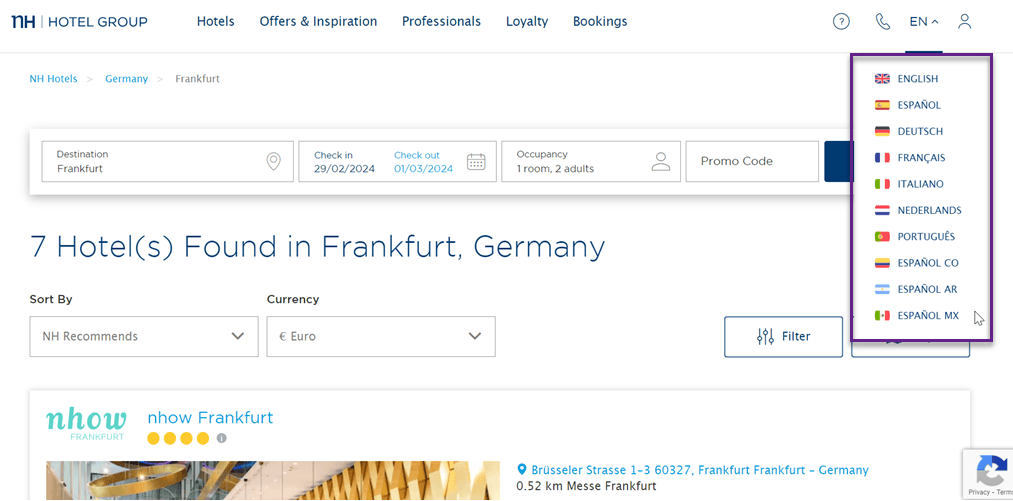
Businesses that sell digital products
Today, many businesses offer digital products such as photos, videos, website themes, applications, games, content templates, and many more. Digital products provide many benefits to consumers, such as easy access, flexibility, and scalability.
Meanwhile, digital products present significant opportunities for businesses to reach international markets. However, to succeed in this endeavor, businesses must translate their product content and websites into various languages.
Creating multilingual digital product in multiple languages helps provide product support information or application documentation and offers product documentation in the local language.
For example, if you sell software or website themes, clear instructions or documentation are needed for users to install the product on their devices. If users come from various parts of the world, it is important to translate into several languages your customers commonly use.
Therefore, it is important to translate digital businesses and products into multiple languages to minimize any obstacles in using or installing the product.
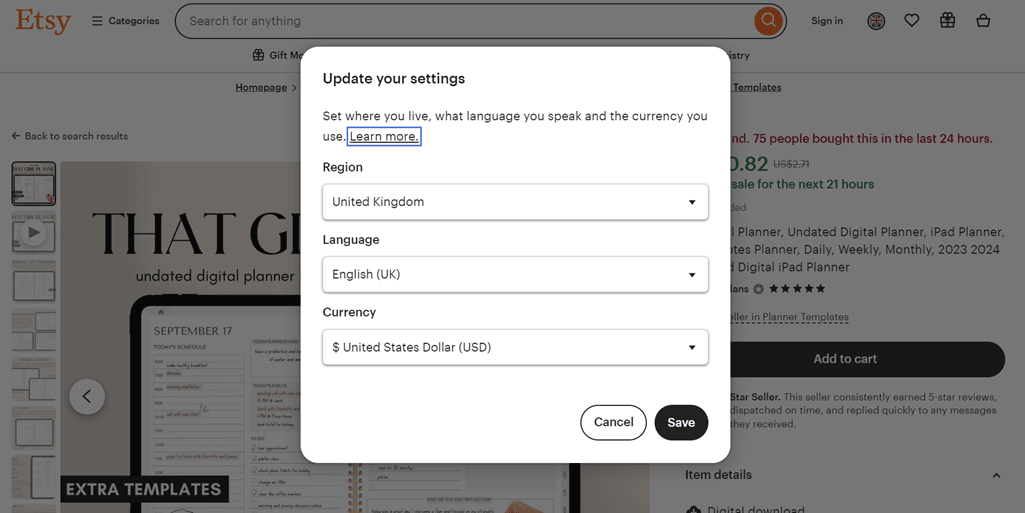
Businesses who want to improve visibility and traffic
Online visibility is key to reaching customers and increasing sales. One way to improve online visibility is by maximizing and growing search engine optimization (SEO) locally and globally.
SEO is optimizing your website to make it easily discoverable by users on search engines such as Google. SEO has several elements that can be applied, and the better they are implemented on the website, the higher the website’s ranking on search engines.
Creating a multilingual website is one way to improve SEO and online visibility.
For example, a business in Malaysia wants to appear in China; this can be achieved by translating the website into Chinese to rank higher on Chinese search engines. Additionally, you can optimize popular keywords in China so your content appears on their search results pages. From there, you can drive Chinese customers’ traffic to your business website originating from Malaysia.
The higher the traffic, the potential for your website’s ranking to increase.
Therefore, creating a multilingual website can help rank local keywords, appear on the search result pages of the target country, increase traffic, and potentially lead to product conversions.
Businesses with potential visitors from abroad
Currently, anyone can view your website anywhere. Even if your business focuses on the local market, it’s not unlikely that your website may have visitors from other countries!
Analytical tools can help indicate where your visitors are coming from. In Google Search Console, for example, you can navigate to Performance > Countries to see the location and language of your visitors.
If you notice traffic from other countries, even if it’s minimal, it means foreigners are interested in your website’s information and offerings. Therefore, consider translating your website into various languages based on the visitors’ countries of origin.
By optimizing website translations for this business, the potential for foreign visitors, even those initially few, to increase is significant. This widens the market reach, potentially attracting new customers in the process.
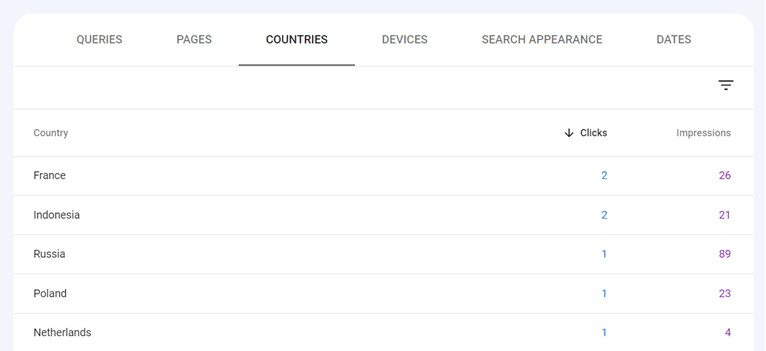
Businesses or companies that offer internships or jobs to people abroad
Companies that hire people from other countries or offer global internships should provide recruitment information in various languages. Language barriers can hinder a business from reaching and recruiting skilled individuals from diverse backgrounds. Meanwhile, on the employee side, businesses or companies opening positions for foreign workers are often difficult to find.
A multilingual career website allows companies to expand their reach by showcasing job opportunities to potential candidates in different countries. This will enable workers outside the company’s country to apply for these positions.
For example, a multinational technology company in the United States seeks a software engineer. If the company translates its website into Indian and Chinese languages, it may find candidates from India or China. Because the company’s career page and job descriptions are translated into Chinese and Indian languages, citizens of India and China can find the website and apply.
Therefore, businesses or companies that offer job opportunities in foreign countries must translate their website into many languages so that potential candidates can understand information about positions, job descriptions, and job benefits.
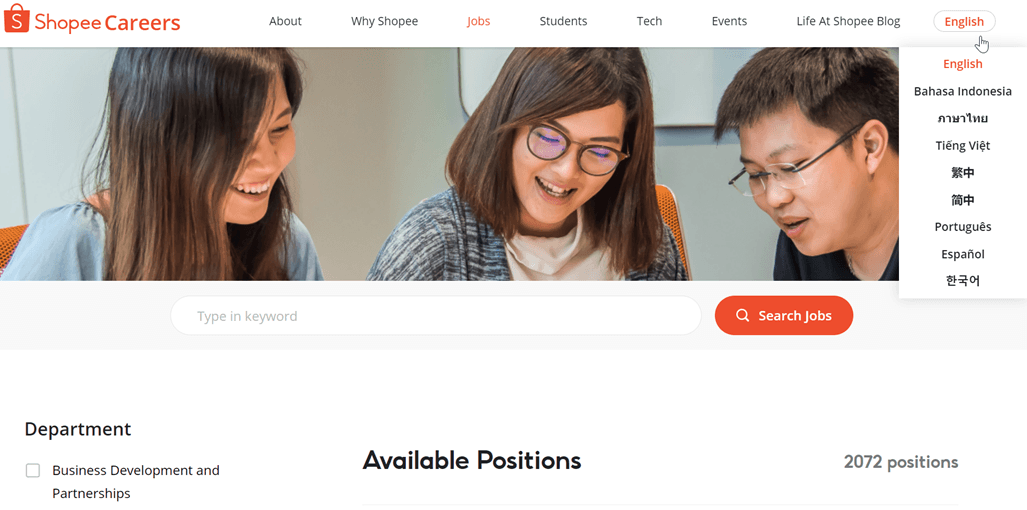
What should you consider when translating a business website?
Now that you know which businesses should be translated into various languages and their reasons, is your business one of them? If so, here are some factors to consider when translating your business website.
Targeting language
The first thing to consider is the target language. To determine the language to be used, identify the language used by your target market. Consider the official language of the country, the majority language, and the language used in the business community. Also, consider some of the hardest languages that need to be considered when choosing a language.
For example, if you have many customers in Spain, translate your website into Spanish. If your business focuses on the Southeast Asian regional market, consider translating into Indonesian, Vietnamese, and Thai. Understand your audience data and their language preferences. Alternatively, if you are unsure, you can also choose a language from the most spoken languages in the world.
Complexity of content
Next is to identify the types of content on your business website. Technical and complex content such as software documentation, scientific, medical, or other specialized phrases require a more skilled translator. This will certainly affect the translation process later on.
Tone and style
The next factor is to consider the tone and style used. Use a tone and style that aligns with your branding and company values. Use a style and language appropriate for the age, background, and profession of your business’s target audience.
For example, in the food or beverage business, a friendly, engaging, and enjoyable tone is typically used, along with a language style that stimulates the reader’s appetite.
Option for language switcher
When translating a website into multiple languages, ensuring that the design language switcher is easy for visitors to access and use is important. Make sure all the languages you selected appear on the button. Also, strategically place language switchers such as website headers or footers so they are easy to find.
Use a language switch button design that fits the website’s overall appearance. Add a flag or language code next to the language name to make it more informative for visitors.
With an optimally functioning language switcher, visitors can easily switch between languages and browse your website in their preferred language. This will increase visitor satisfaction and help you achieve your business goals through a multilingual website.
SEO optimization
Next is considering search engine optimization (SEO) for each target language. Good optimization can improve your business website’s visibility in user searches.
Several important multilingual SEO elements need to be implemented in optimizing the website. Some of these include:
- Keyword research
- URL structure
- Submitting a multilingual sitemap
- Implementing hreflang tags to avoid duplicate content. And implement hreflang codes in the URL.
- Use keywords in the URL slug and others.
Consistency phrase all pages
Ensure that all words and phrases on your website are translated accurately and consistently across all web pages. Inconsistent translations between pages can confuse visitors. Use the same translated phrase for terms that may appear on all pages.
The same goes for your business brand name and various technical terms. If the translation of your business name sounds odd, it’s important to exclude the translation of the brand name or other technical terms. This ensures that these phrases are not translated and left as originally.
Costs and budget
Website translation requires a significant amount of cost and budget therefore, consider the cost and create a realistic budget. Translation costs are influenced by the length of content, the number of words on the website, the complexity of the language, and the level of professionalism required. Allocate translation costs within your overall marketing budget.
Website translation methods
There are several methods for translating websites, including professional human translators, machine/automatic translation, or a combination of both. Human translators produce accurate and natural translations but require more time and cost.
Meanwhile, machine translation is faster and cheaper but needs to be more accurate. Therefore, combining the two can balance their respective advantages. Choose the method that best suits your business goals.
Combining these two translation methods can be obtained through a machine translation. However, unlike Google Translate, it only translates quickly but often needs to provide accurate results. It also lacks additional editor features to edit translations directly and collaborate with translators.
Therefore, choosing a translation service that supports outstanding features like an editor is important.
One service that supports these outstanding features is Linguise. This website translation platform supports translating various types of websites mentioned earlier.
Linguise’s support features allow you to translate business websites easily and smoothly. So what features are offered?
Linguise: the best option for businesses that need multilingual website
Linguise AI automatic translation is an automated web translation service that can be used on various websites regardless of industry sector.
With a combination of neural machine translation technology and AI, Linguise produces accuracy equivalent to human translation. Thus, your website will be translated quickly and accurately.
No need to worry about the platform! Because Linguise supports more than 40 CMS and web builders. So it can be integrated anywhere. What does Linguise offer to meet your business website translation needs? Here are some reasons why choosing Linguise for your business
Providing 85 language options – Linguise offers more than 85 languages, allowing your business to choose which languages to add after determining the target language beforehand. There are various languages ranging from traditional to national.
High translation accuracy – Although using machine translation, Linguise has perfect translation quality. Moreover, the translation results are contextually appropriate and flexible. Linguise translation accuracy is almost similar to human translation.
100% SEO support – Linguise fully supports SEO optimization, some of which include automatic hreflang tag application, translated URLs, hreflang codes on URLs, multilingual sitemap creation, and much more. This helps you optimize your business website without the hassle of doing it manually.
Providing translation exclusion feature – not all services offer translation exclusion features with easy configuration. However, unlike Linguise. You can exclude translations based on text, exclude pages, or others.
Providing live editor translation feature – the live editor translation is useful for editing automatic translations generated by Linguise. Thus, the translation results of your website will be more accurate because they combine these two elements. You can also add translators to the dashboard and provide them with live editor access.
Option for customizing language switcher – Linguise offers a setup language switcher option via the dashboard. You can edit buttons, use flag icons, set font sizes, and more.
Affordable translation costs – lastly, your business doesn’t need to worry about costs because the prices of Linguise are affordable. You can choose from three packages, starting from $15/month, and a free trial feature for 30 days with unlimited 600,000 words before subscribing.
Conclusion
So, now you know what types of businesses you should translate. Translating your business website into multiple languages is crucial to reach more potential customers worldwide.
Some key business types that should be translated include international e-commerce businesses, businesses in multilingual countries, tourism businesses, digital product businesses, and businesses targeting global talent.
When translating, consider target languages, content complexity, language style, optimization, translation service, etc. Linguise is the best automatic translation service to help businesses solve websites easily because of its advanced features.
So, don’t hesitate anymore! Register for a Linguise account to translate your business website and expand internationally!

